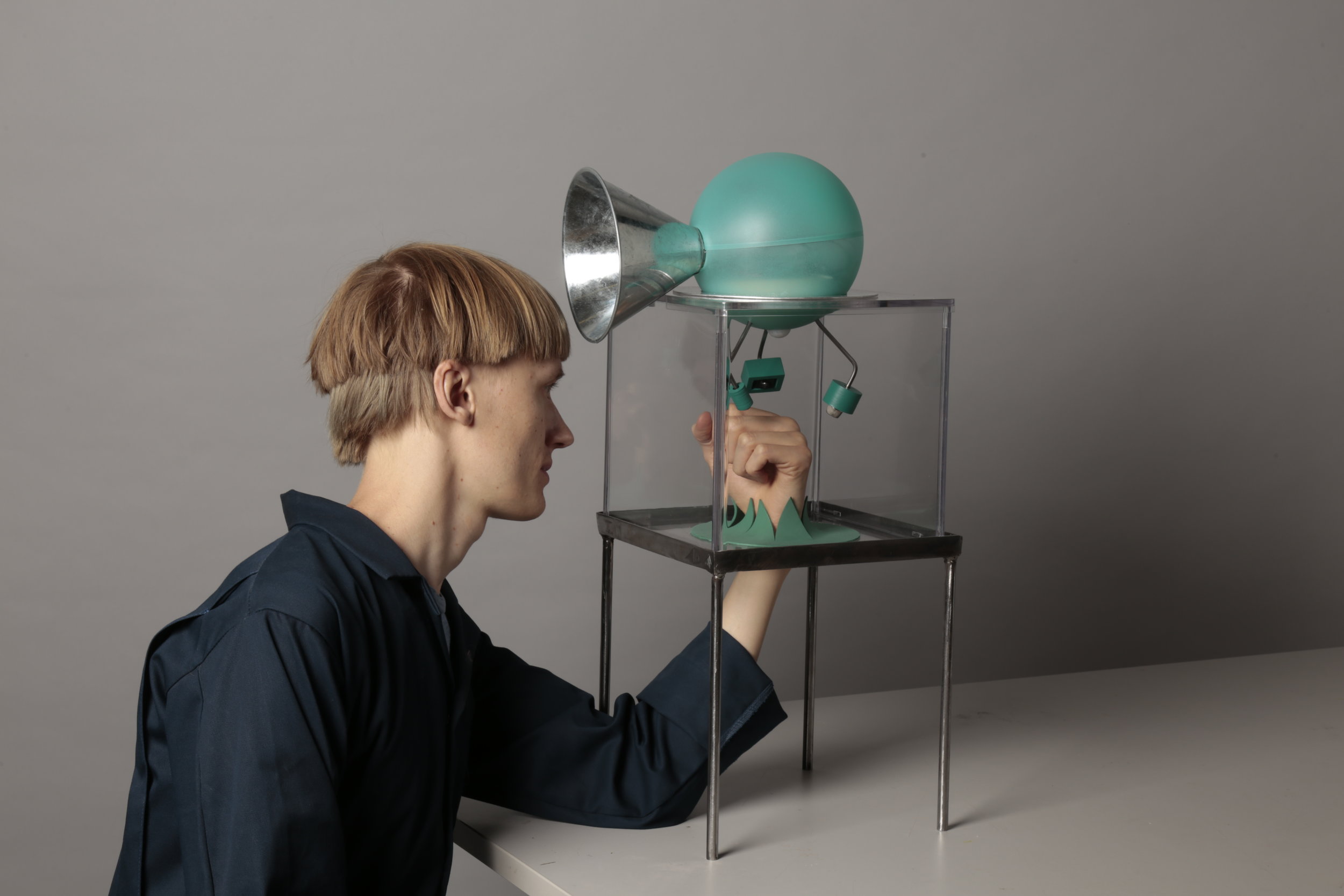Mosquito Translator
Making kin as oddkin - a bond of blood
A mosquito translator machine, using sensors and cameras as input and outputting sounds and words, seeking a space of solidarity with the non-human, troubling the idea of to whom one is responsible.
Work Description
The work consists of an installation, where the audience is presented with a glass chamber full of mosquitos. The chamber has multiple openings/doors, where humans can voluntarily put their hand and arm inside the chamber to meet/feed the mosquitos. Sitting on top of the chamber is the “translator machine”, a device that creates the bridge between mosquitoes and humans, while also being an entity in itself.
Rationale
“We - all of us on Terra — live in disturbing times, mixed-up times, troubling and turbid times. These times called the Anthropocene are time of multispecies, including human, urgency: of great mass death and extinction; of onrushing disasters; of unprecedented looking away. How can we think in times of urgencies without the self-indulgent and self-fulfilling myths of apocalypse, when every fiber of our being is interlaced, even complicit, in the webs of processes that must somehow be engaged and repatterned? [...] Multispecies kinship queers how we might think about and practice making kin; it is no longer at all about fruitful heterosexual pair bonds producing babies. Making kin as oddkin rather than biogenetic family, to think beyond inherited categories and capacities enables thinking, feeling and becoming with other beings, humans or not. Multispecies kinship troubles the idea of to whom one is actually responsible.” [1]
Underneath the problems of the Anthropocene is a view that humankind has the right to manipulate (create, destroy, alter) other species and our surroundings. This view is called Anthropocentrism - placing the human in the center and on top. Anthropocentrism is the idea that humans have a unique, significant, and exceptional position on the planet. It is the idea that humans are more real than non-humans, because we can think. But thinking is not the only access mode into the world, and it is not necessarily the best access mode either.
As the contemporary philosopher Timothy Morton shows in his work “Humankind: Solidarity with Non-Human People”, the task at hand is to transition from this perspective to one where the worlds of all beings are considered equally real. Replacing anthropocentrism with a solidarity with the non-human. [2]
Heeding Donna Harraway’s call of “making kin, not babies”, we want to explore the use of technology to form kinship with a distant cousin: the mosquito. Making kin requires establishing solidarity and awareness with the non-human, of activating empathy and compassion not only to care about their suffering, but to grant them agency and respect; to listen.
Philosopher Vinciane Despret, who in her paper “The becomings of subjectivity in Animal Worlds” describes the importance of not assuming that the human condition is something unique and superior to be able to talk to animals. Despret takes the example of Alex the parrot who is trained by scientists to talk, and stresses the importance of treating Alex as an equal, of letting the parrot speak:
“Alex doesn’t talk in the name of a ‘‘we’’ of parrots successfully imposed by scientists, but in the name of a ‘‘we’’ constituted by the assemblage of a parrot and human beings equipped with an apparatus aimed at making the parrot talk well.” [3]
But how can we ever understand the world of a mosquito, since we never exit the world of being human? Morton describes it as being “shrink-wrapped in [our access modes], so that we anthropomorphize everything. But that doesn’t mean that there’s no outside at all, or that we are caught forever within anthropocentrism. There’s a big difference between saying that we anthropomorphize and that we are anthropocentric.” [2]
The translator will use technology to increase the overlap in worlds with the non-human. Creating an affective experience of a different world that is relatable to humans, such as sound and words or smells.
In physicist Karen Barad’s terms, by listening to the mosquito, we attend to an imbalance in power, we are open to the possibility of mutual response - a response-ability. [4]
The intention of the work is partly to probe and push the limits of the knowable to enable modesty and reverence to the unknowable. But also to celebrate how we can, with the use of technology, expand our awareness, consciousness and solidarity, to find a way of becoming with the non-human - a positive and imaginative way out of the death grip of the sixth extinction.
Why Mosquito?
As oddkin, our progeny may not be human, much less our biological offspring. However, as Heather Davis argues in her essay “Toxic Progeny: The Plastisphere and Other Queer Futures”, we have an extra responsibility to species created through anthropogenic processes. [5] A certain species of mosquitoes common in cities, called the London Underground Mosquito, has evolved due to human actions - it is a bastard child that will most certainly outlive us. [6] Claiming kinship to an “unpopular parasite” is thought provoking, and is intended to make us challenge and re-think for who we are responsible, and how we are actually codependent through a deep biospheric bond - a bond of blood.
Next Step
This work is currently in progress, we are currently exploring options to turn the prototype into a full scale installation. If you have any thoughts, input, or can support us in any way, contact us! :)
References
2. Timothy Morton. (2017) Humankind: Solidarity with Non-Human People. Verso Books.
3. Despret V. (2008) The Becomings of Subjectivity in Animal Worlds. Subjectivity. 2008;23: 123–139. doi:10.1057/sub.2008.15


